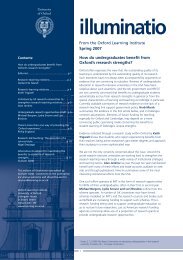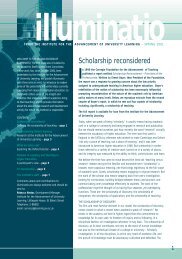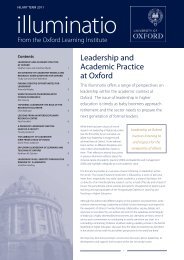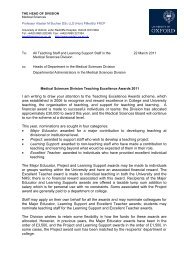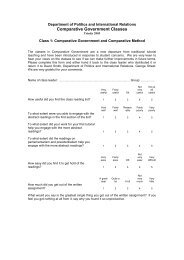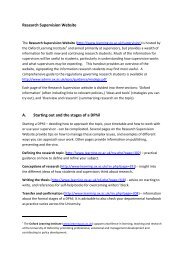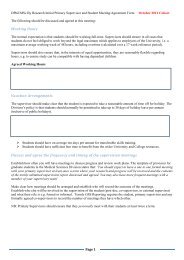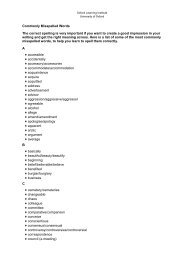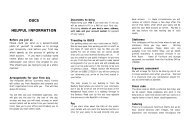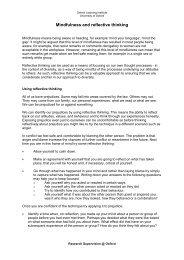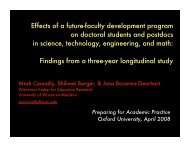Developing the whole student - Oxford Learning Institute - University ...
Developing the whole student - Oxford Learning Institute - University ...
Developing the whole student - Oxford Learning Institute - University ...
Create successful ePaper yourself
Turn your PDF publications into a flip-book with our unique Google optimized e-Paper software.
Stimulus paper by Kathleen M. Quinlan 10<br />
Studies in <strong>the</strong> 1990s focused more on civic engagement and racial/ethnic attitudes.<br />
<strong>University</strong>-educated citizens:<br />
I Vote more and are more knowledgeable about democratic processes and<br />
socio-political interests;<br />
I Engage in more political activities, social activism and support for civil liberties;<br />
I Are two to three times more likely to engage in community service than<br />
non-university-educated citizens 52 .<br />
There are also increases during <strong>the</strong> university years in:<br />
I Positive attitudes toward racial equality and tolerance;<br />
I Awareness and understanding of o<strong>the</strong>r cultures;<br />
I Interactions with people of different cultural or ethnic backgrounds;<br />
I Commitment to fostering racial understanding 53 .<br />
Based on longitudinal studies, <strong>student</strong>s also make significant gains during <strong>the</strong> university<br />
years in <strong>the</strong>ir level of principled moral reasoning. In <strong>the</strong>ir first year, <strong>student</strong>s are more<br />
likely to rely upon authorities in deciding what is right (ie conventional moral reasoning),<br />
whereas by graduation <strong>the</strong>y are more likely to apply universal moral principles (ie<br />
principled moral reasoning) 54 .<br />
52<br />
Pascarella and Terenzini (2005)<br />
53<br />
Pascarella and Terenzini (2005)<br />
54<br />
Pascarella and Terenzini (2005)<br />
55<br />
Arthur, Wilson et al (2009)<br />
56<br />
Belfield, Bullock et al (1999)<br />
57<br />
Arthur, Wilson et al (2009)<br />
58<br />
Such as Gamson (1991) and<br />
Ambrose et al (2010)<br />
59<br />
Colby, Ehrlich et al (2003)<br />
Two major studies we have located which address <strong>student</strong> development in <strong>the</strong> UK are<br />
both based on <strong>student</strong>s’ or graduates’ perceptions of <strong>the</strong> contributions of <strong>the</strong>ir higher<br />
education to <strong>the</strong>ir character 55 or general development 56 . In Belfield et al’s (1999) survey<br />
of 12,000 UK graduates, graduates perceived that <strong>the</strong> strongest contributions of higher<br />
education were to getting an interesting job and securing a good income, as well as to<br />
increasing <strong>the</strong>ir self-confidence. Fur<strong>the</strong>r analyses showed that arts and humanities degrees<br />
led to greater reported contributions to general personal skills (communication and selfconfidence)<br />
than job-related variables (income and interesting jobs). The opposite pattern<br />
was true of science graduates. Meanwhile Arthur’s interviews with higher education<br />
<strong>student</strong>s in 2009 57 indicate that <strong>the</strong>y do not see higher education as having a strong<br />
contribution to <strong>student</strong> character. Thus, while a reliance on graduates’ views suffers<br />
from some methodological difficulties with respect to establishing <strong>the</strong> impact of higher<br />
education, toge<strong>the</strong>r <strong>the</strong>se two studies imply that UK higher education does not currently<br />
have a strong impact on <strong>student</strong>s’ holistic development.<br />
Yet it would appear that university education has <strong>the</strong> potential to impact on some<br />
key aspects of <strong>student</strong>s’ holistic development; but, how and under what conditions?<br />
The answers to <strong>the</strong>se questions are crucial for leaders who wish to create university<br />
environments that lead to holistic <strong>student</strong> development. I turn to <strong>the</strong>se questions in <strong>the</strong><br />
next section.<br />
What educational activities support<br />
this type of development?<br />
Active, engaged pedagogies, such as experiential education, service learning, problembased<br />
learning and collaborative learning are all effective not only in supporting academic<br />
learning, but also learning moral and civic engagement. All share a foundation in basic<br />
principles of learning 58 . Colby et al 59 argue that ‘<strong>the</strong> development of values and goals,<br />
moral and civic identity, and a sense of efficacy, hope and compassion is even more



